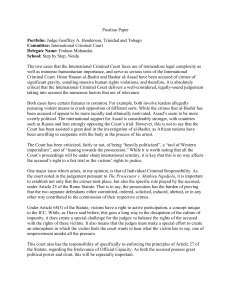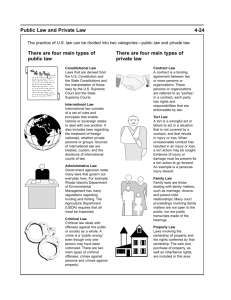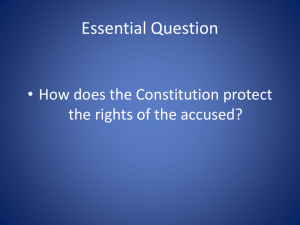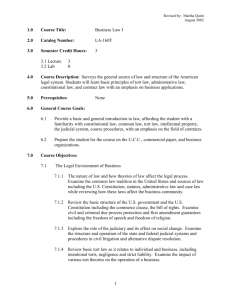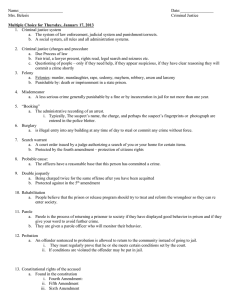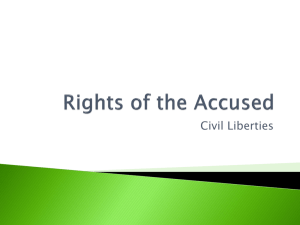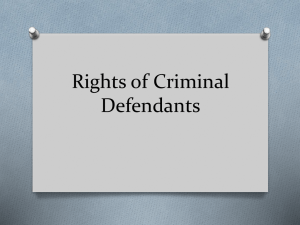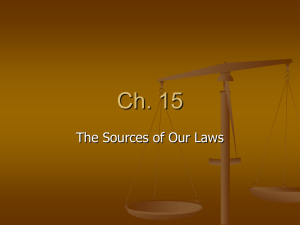Types of Laws
advertisement
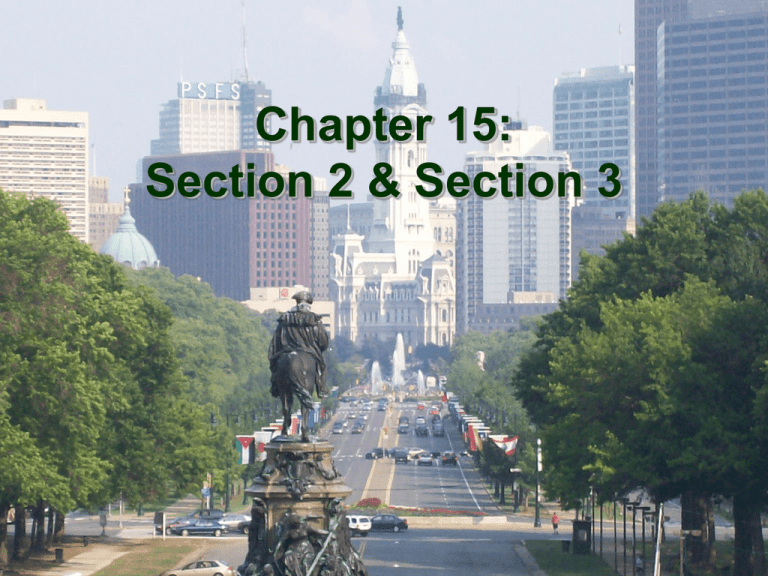
Chapter 15: Section 2 & Section 3 Criminal Law • Aimed at preventing harm to people and property. • In the courts, there is an ‘adversary system’: – Each lawyer presents the strongest case for its side. – The judge is supposed to be impartial • In criminal cases, government is always the plaintiff: – the party that brings charges against the accused. Criminal Law • The accused is called the defendant • Two ‘grades’ or levels of crimes: – Felonies: crimes with serious consequences for the victim; includes rape, murder, arson, etc. – Misdemeanors: typically less serious; includes vandalism and theft of inexpensive items. • Punishable by fines or jail terms of less than a year • Crimes against property are the most common (illegally taking it or destroying it). Criminal Law • Three types of stealing: – Larceny: the unlawful taking away of another person’s property with no intent to return it. – Robbery: the taking of a person’s property by force or threats (often with a weapon). – Burglary: Unlawful entry into a ‘dwelling’ or ‘structure’ with the intent to commit a crime. Civil Law • Concerns disputes between people or groups when no laws have been broken. • When a civil case goes to court, it’s called a lawsuit. • People must take the initiative to file a lawsuit. • Often times, lawsuits are about contracts (written, spoken, or implied). Civil Law • Tort Law: – Tort: a civil wrong – For example, a person is injured and claims that another party is responsible. • Family Law: – Regulated by state law – Involves divorce, child custody, abuse, etc. Other Types of Laws • Constitutional Law: – Law that deals with the formation, construction, and interpretation of constitutions. – Cases about constitutional law helps decides the limits of gov’t power and the rights of the individual. • Administrative Law: – Refers to the rules and regulations the executive branch must make to carry out its job. Other Types of Laws • Statutory Law: – Involves statutes, or laws written by any legislative branch of the gov’t – Statutes may include speed limits, food inspection rules, and even the right to return merchandise to a store. Legal Rights in the Constitution • Stare Decisis: – The process of using rulings in earlier cases to build decisions about similar cases in the future. – Latin for “let the decision stand.” • Writ of Habeas Corpus: – A writ is a written legal order – Requires officials to bring people to court and explain why they are being held. Legal Rights in the Constitution • No bills of attainder: – These are laws that punish the accused without a trial or a fair hearing. • No ex post facto laws: – A law that punishes a person for something that was not illegal when it was committed. • Due Process of Law: – Gov’t may not take lives, liberty, or property without the ‘proper exercise of the law’. – Guaranteed by the 5th and 14th amendments. Rights of the Accused • 4th Amendment: – protects against unreasonable searches and seizures – Requires a search warrant (judges authorization) • 5th Amendment: – protects against self-incrimination and double jeopardy • 6th Amendment: – Right to be defended by a lawyer – Right to a speedy, fair trial by an impartial jury. Rights of the Accused • Plea bargaining – a negotiation between the defense attorney and the prosecutor (gov’t’s attorney) – Because of this, most trials do not come to court • 8th Amendment: – Protects against: • Cruel and unusual punishments • Excessive bails and fines – Bail: a sum of money an arrested person pays to a court to win release from jail while awaiting trial
